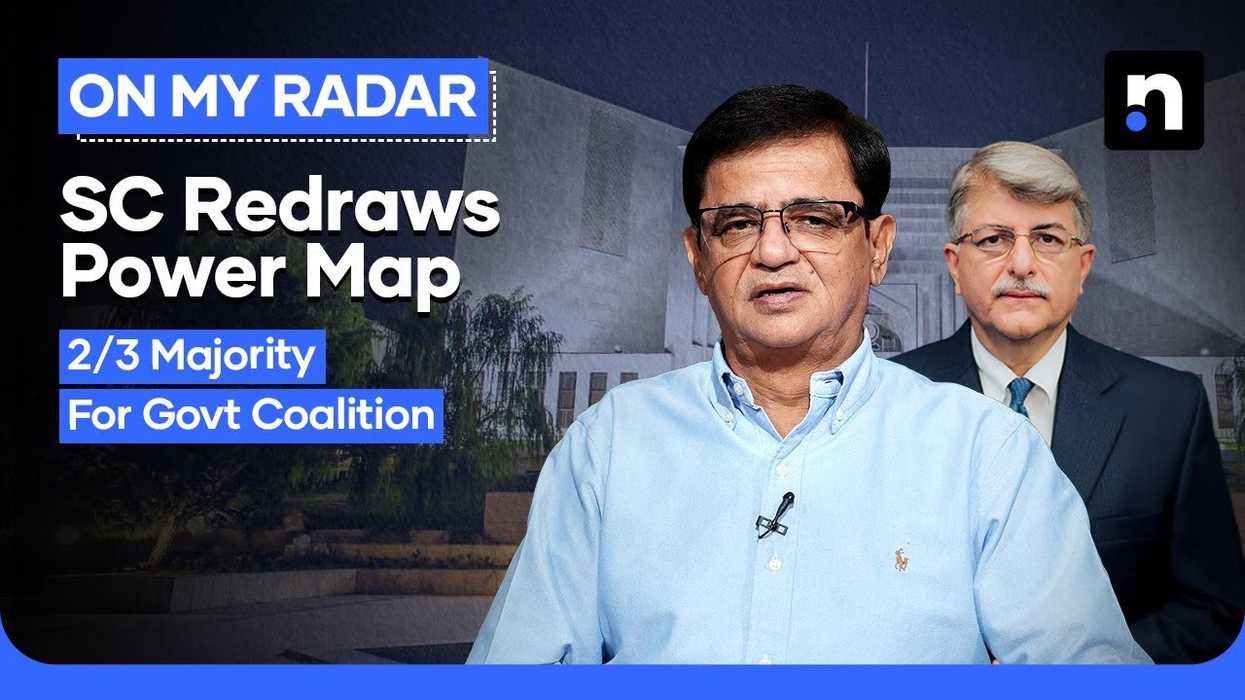PTI sidelined as court ruling gives coalition two-thirds majority in parliament
Top court's reversal on PTI's reserved seats marks a major shift in Pakistan's parliamentary landscape, says Kamran Khan
News Desk
The News Desk provides timely and factual coverage of national and international events, with an emphasis on accuracy and clarity.
The final outcome of Pakistan’s February 2024 general elections and the 26th Constitutional Amendment came into full view last week as the Supreme Court stripped the Pakistan Tehreek-e-Insaf (PTI) of all its reserved seats, handing the ruling coalition a decisive two-thirds majority in parliament.
A 12-member constitutional bench, formed under the 26th Constitutional Amendment, delivered its verdict over the weekend, with seven judges ruling that PTI is not entitled to reserved seats for women and minorities in both the National and Khyber Pakhtunkhwa assemblies.
With the verdict, PTI loses 22 seats in the National Assembly and 25 in the KP Assembly, allowing the ruling alliance led by the Pakistan Muslim League-Nawaz (PML-N) and the Pakistan Peoples Party (PPP) to gain full legislative control.
“The government now has the numbers not just to pass laws but to amend the Constitution at will,” Kamran Khan said in his vlog, calling the court ruling a watershed moment for parliamentary supremacy.
Before the decision, the ruling alliance held 214 seats in the National Assembly. That number will now increase to 233 — comfortably above the 224 required for a constitutional majority. PML-N alone gains 15 seats, PPP secures four, and Jamiat Ulema-e-Islam-Fazl (JUI-F) adds three.
In KP, the opposition’s strength rises from 27 to 52, compared to PTI’s dwindling 58. Analysts believe this shift could significantly affect upcoming Senate elections.
The judgment also puts to rest political uncertainty over military appointments. The 26th amendment, now reinforced by judicial authority, has codified provisions related to the extension and reappointment of military leadership, ending speculation over the tenure of Army Chief Field Marshal Syed Asim Munir.
The origins of the legal dispute lie in PTI’s failure to hold intra-party elections in line with Election Commission rules ahead of the 2024 vote. As a result, the party lost its “bat” election symbol and its candidates ran as independents under the banner of Sunni Ittehad Council (SIC), winning 88 seats in the National Assembly.
The Election Commission of Pakistan (ECP) denied the SIC reserved seats, triggering a legal battle that saw conflicting decisions from the Peshawar High Court and later a landmark majority ruling in July 2024 by an eight-member Supreme Court bench led by Justice Mansoor Ali Shah, which had ordered that PTI be allotted the reserved seats.
But under the new judicial framework enabled by the 26th amendment, all constitutional matters were redirected to the newly established constitutional bench. On review petitions filed by the Election Commission, PML-N, and PPP, the bench — led by Justice Aminuddin Khan — overturned the July 2024 decision with a 7-5 majority.
Among the judges who ruled against PTI were Justices Masrat Hilali, Naeem Akhtar Afghan, Shahid Bilal Hassan, Muhammad Hashim Khan Kakar, Aamer Farooq, and Ali Baqar Najafi.
With the court’s decision now final, speculation grows over how the internal dynamics of the ruling alliance might shift. While PML-N gains the most, questions remain over PPP’s future bargaining power within the coalition.
“Some say PPP’s ability to ‘blackmail’ the government may now diminish,” said Kamran Khan, referring to the party’s frequent leverage tactics on budget allocations and legal reforms. “But the numbers still don’t give PML-N an outright simple majority without them.”
PML-N has 125 seats. Even with MQM-P and smaller parties contributing 34 more, the tally reaches just 159 — still 10 short of the 169 needed for a simple majority. Unless it draws support from at least 10 PTI-affiliated independents, sidelining PPP may not be viable.
The ruling may also diminish the traditional role of smaller parties like MQM-P, PML-Q, and BAP — often seen as kingmakers — by consolidating power between the two dominant coalition partners.
Still, the biggest blow falls on PTI, already reeling from internal disarray and legal troubles. Its leadership remains largely imprisoned since the May 9 riots, and its parliamentary strategy lies in tatters.
Several PTI lawmakers face potential disqualification if convicted in May 9-related cases, with the Supreme Court setting Aug. 8 as the deadline for verdicts.
“If those convictions go through, PTI could lose even more ground in parliament,” Kamran Khan warned.
Beyond the immediate fallout, the ruling sets a critical precedent: that Supreme Court decisions can directly reshape parliamentary numbers. Legal scholars are also questioning the legitimacy of a 12-judge bench overturning a previous 13-member full-court decision with a larger majority of eight judges.
But for now, the ruling coalition has emerged stronger, and the path is clear for it to legislate without resistance — unless internal fractures change the equation again.
“This is not just a legal judgment,” Khan concluded. “It’s a complete shift in Pakistan’s political and constitutional architecture.”








Comments
See what people are discussing